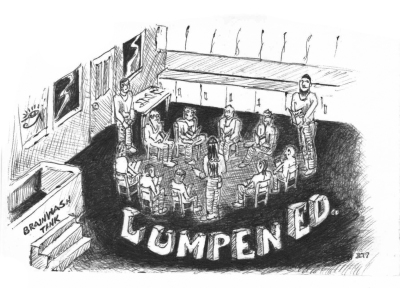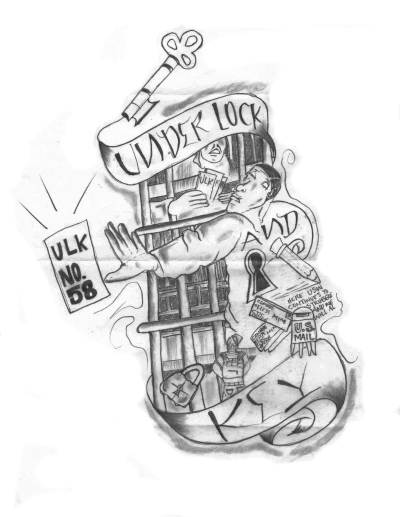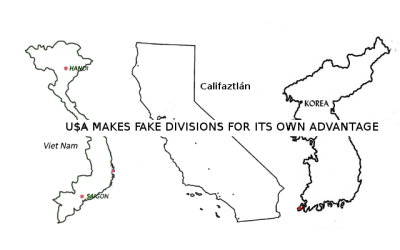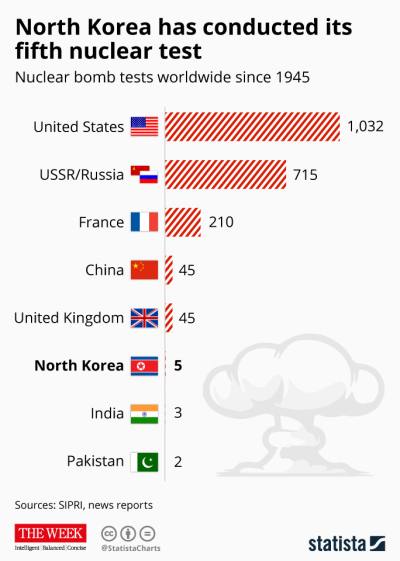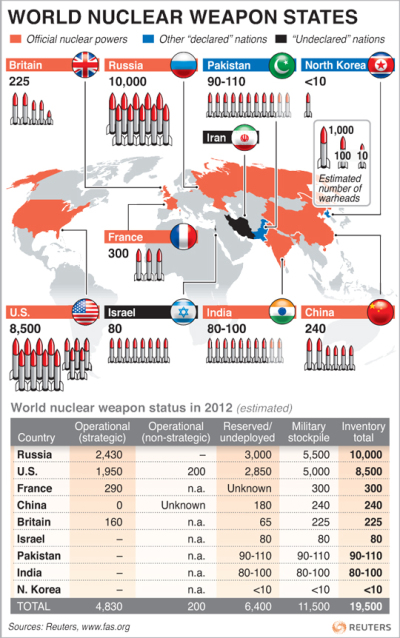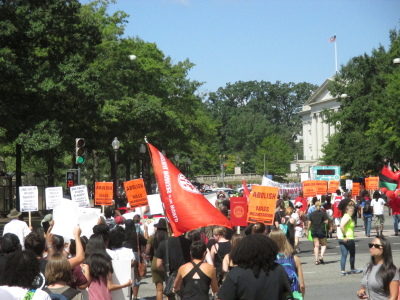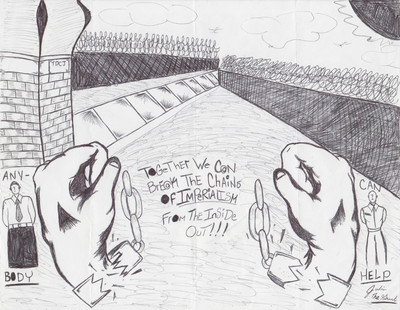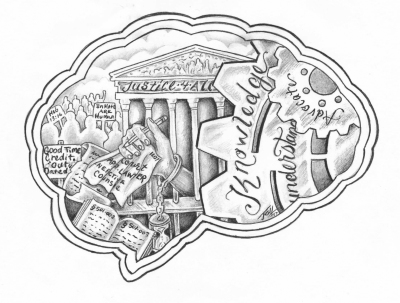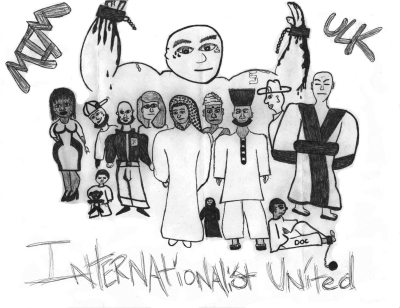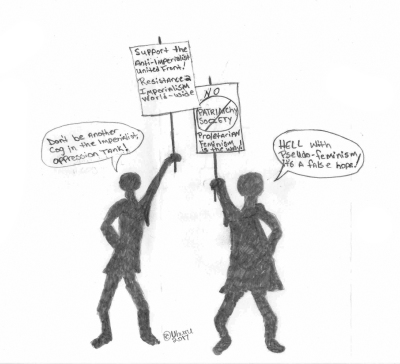
Censors in Their Own Words - September 2017
U.$. imperialist leaders and their labor aristocracy supporters like to criticize other countries for their tight control of the media and other avenues of speech. For instance, many have heard the myths about communist China forcing everyone to think and speak alike. In reality, these stories are a form of censorship of the truth in the United $tates. In China under Mao the government encouraged people to put up posters debating every aspect of political life, to criticize their leaders, and to engage in debate at work and at home. This was an important part of the Cultural Revoluion in China. There are a number of books available in this country that give a truthful account, but far more money is put into anti-communist propaganda books. Here in Amerika free speech is reserved for those with money and power.
In prisons in particular we see so much censorship, especially targetting those who are politically conscious and fighting for their rights. Fighting for our First Amendment right to free speech is a battle that MIM(Prisons) and many prisoners waste a lot of time and money on. For us this is perhaps the most fundamental of requirements for our organizing work. There are prisoners, and some entire prisons (and sometimes entire states) that are denied all mail from MIM(Prisons). This means we can’t send in educational material, or study courses, or even supply a guide to fighting censorship. Many prisons regularly censor ULK claiming that the news and information printed within is a “threat to security.” For them, printing the truth about what goes on behind bars is dangerous. But if we had the resources to take these cases to court we believe we could win in many cases.
Denying prisoners mail is condemning some people to no contact with the outside world. To highlight this, and the ridiculous and illegal reasons that prisons use to justify this censorship, we will periodically print a summary of some recent censorship incidents in ULK.
We hope that lawyers, paralegals, and those with some legal knowledge will be inspired to get involved and help us with these censorship battles, both behind bars and on the streets. For the full list of censorship incidents, along with copies of appeals and letters from the prison, check out our censorship reporting webpage.
North Carolina fears ULK promotes insurrection
Doug Pardue, Chair of the North Carolina Department of Public Safety’s (NCDPS) Publication Review Committee (PRC) censored ULK 55, for the article “Regarding Daily Body Searches”, stating that it “promotes insurrection.” After appealing this censorship, Director of Rehabilitative Programs and Services upheld the decision citing these lines:
“Persynally I believe that we should shut down all movement but still go to Yard, programs and accept our food. Just make the pigs do all the work… the only way we know how to deal with an opposition is thru the motion of our resistance.”
Ms. Sullivan writes, “These statements could possibly lead to insurrection which is a violation of our policy on publications.” Apparently insurrection is a passive activity, and peaceful protest is a threat to institutional safety. Kind of ironic from a state that has a memorial to Martin Luther King Jr. inscribed with the following words:
…“AFRICAN-AMERICANS AND FAIR MINDED PEOPLE OF ALL RACES, ENGAGED IN MASSIVE CIVIL DISOBEDIENCE SERVED NOTICE ON THE NATION AND THE WORLD THAT THEY WOULD NO LONGER TOLERATE THE ABUSES OF AMERICAN RACISM. THE CIVIL RIGHTS MOVEMENT HERALDED A NEW ERA IN OUR COLLECTIVE RESOLVE TO ADHERE TO THE PRINCIPLES OF ‘LIBERTY AND JUSTICE FOR ALL’…
Still can’t stay true to MLK’s message in 2017.
Last year, NCPDS censored ULK 53 for the control unit survey. This was even more surprising. Upon our appeal, Nicole E. Sullivan, Director of Rehabilitative Programs and Services upheld the decision, writing:
“[T]he issue lies in the first sentence of the article which describes Control Units in inflammatory language equating them with political repression and torture. Control Units are not used in that manner in our facilities. Such language can encourage insurrection and disorder. Therefore the original decision is to withhold delivery is affirmed.”
Ms. Sullivan ruled no free speech for MIM(Prisons) because any critique of eir agency’s practices might cause an insurrection.
Just recently, one comrade who had ULK 55 censored and received our appeal letter responded:
“The NCPDS is quick to make any kind of negative judgment against prisoners. A man can say ‘boo’ and they feel threatened. I would like to know how they can even mention this material being against the prisoners’ rehabilitation, where there is no such thing as rehabilitation in the department of NCPDS anymore. If a prisoner gets any rehabilitation, he gets it on his own.“All the classes that might have been helpful with getting prisoners any rehabilitation have been closed down. More than that, most of the time after completing the class, proof of graduation completion certificates aren’t worth the paper they are written on.
“I totally agree with the analysis of the appeal letter.”
Missouri bans ULK
A subscriber at Jefferson City Correctional Center forwarded a copy of eir censorship notification for ULK 56. This comrade believes the state has banned all ULK although no formal notification has been given to either recipients or MIM(Prisons). The case manager for the prison refused to give this prisoner a grievance to file so ey could not even fight the ruling.
“The Censorship Committee has reviewed materials sent to you. Pursuant to our review of this material, we conclude that the security of this institution will be at risk if the material is delivered to you within this institution because the material:
1. constitutes a threat to the security, good order or discipline of the institution;
2. may facilitate or encourage criminal activity; or
3. may interfere with the rehabilitation of an offender
”Additional comments: contains articles that could constitute a safety and security risk.”
Virginia DOC denies ULK 55 for lots of reasons but nothing specific
The Virginia DOC at least followed their rules in informing MIM(Prisons) that our publication was denied. Although the letter was sent months after this issue of ULK was mailed to subscribers. And still they claim we get only 15 days to appeal!
“You are hereby advised that the following issue(s) of publication(s) sent to an offender of the Virginia Department of Corrections have been disapproved for delivery to offenders of the Department:
Under Lock & Key March/April 2017 No. 55 page 5, front cover
for the following reasons:
D. Material, documents, or photographs that emphasize depictions or promotions of violence, disorder, insurrection, terrorist, or criminal activity in violation of state or federal laws or the violation of the Offender Disciplinary Procedure.
F. Material that depicts, describes, or promotes gang bylaws, initiations, organizational structure, codes, or other gang-related activity or association.”
Hamilton CI in Florida censors guide to fighting censorship
In clear proof that Florida isn’t reading the mail they censor, on July 20 we got a censorship notification from the Florida DOC along with the letter back that they had denied. This letter is our guide to fighting censorship in prisons. It contains information about regulations and laws, and how to appeal censorship. It’s quite a stretch to consider any of the below reasons applicable to this document. More likely the mailroom is now just censoring all of our mail for these reasons.
“Your correspondence is being returned for the following reason(s):
”Otherwise presents a threat to the security, order, or rehabilitative objectives of the Correctional System, or to the safety of any person.
“Depicts, describes or encourages activities which may lead to the use of physical violence or group disruption.
”Encourages or instructs in the commission of criminal activity.”
ULK 57 banned from Pennsylvania prisons for “advocating solidarity”
Apparently Pennsylvania considers any unity among prisoners to be dangerous. And so they banned all Pennsylvania prisoners from receiving ULK 57 because it “advocates solidarity.” The Merriam-Webster dictionary defines solidarity as “unity (as of a group or class) that produces or is based on community of interests, objectives, and standards.” Perhaps Pennsylvania hopes to keep prisoners distracted fighting one another rather than united against the abuse of the injustice system.
“Please be advised that the following publication has been denied to all inmates housed in the Pennsylvania Department of Corrections:
”Under Lock & Key, #57, July/August 2017.
“The publication was denied for the following reasons:
”Information on page 11 advocates solidarity.”
Pennsylvania denies ULK for article about PA prisons
“The following publication addressed to you has been reviewed and found unacceptable for the reason(s), indicated below, based on the criteria set forth in the DC-ADM 803 ‘Inmate Mail and Incoming Publications’ policy Section 3.E.3.
Name of publication: Under Lock & Key – July/August 2017
Volume/number: 57. <BR.”Section II
b. security issues
“(4) Racially inflammatory material or material that could cause a threat to the inmate, staff, or facility security; page number(s) 21, 24.
Brief description: States that ‘the strip searches in the PA DOC are only for harassment purposes and we the people need to learn to fight and take a stand against the “pigs” in the prisons’ referring to the correctional officers.”
Illinois claims ULK is on Disapproved Publication List
Denying ULK 56 , the Illinois DOC offered only this justification to the prisoner’s appeal: “Based upon this review, the following action is recommended: Denial – The publication is listed on the Disapproved Publication List.”
Georgia censors ULK for being “reading material”
ULK 56 was sent back to us with a rejection form. The reason for rejection: “Other: reading Material (denied by legal in Atlanta)”.
Washington rejects ULK 57 for article by prisoners
Washington DOC sent us individual rejection slips for at least ten prisoners, all claiming that ULK 57 violates law, policy, code or rules. Rather than give specifics, they offered several rather vague reasons as justification including info on STGs, overthrowing the government, and articles by other prisoners in other facilities. It’s pretty hard to fight such general claims. And in fact most of ULK is written by prisoners, but that’s not a legal justification for censorship.
“Reason 8. Contains plans for activity that violates state/federal law, the Washington Administrative Code, Department policy, and/or local facility rules.
“Comments/other reasons: 8. contains security threat group information and threat to penological object on overthrowing the government page 3, 11, and 13. A lot of articles that other offenders from other facilities.”
Illinois returns study group lesson unopened
A letter sent to an Illinois prisoner was returned to us, unopened with the reason “unapproved correspondence.” The envelope contained a 4 page intro to MIM(Prisons) and an invitation to our mail-based study group with the first reading and questions attached. How could Illinois know this was not approved if they didn’t bother to open the letter to look at the contents?
Related Articles:




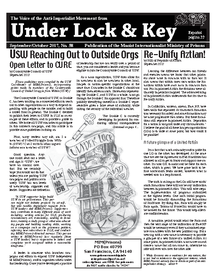
 Download printable PDF
Download printable PDF



